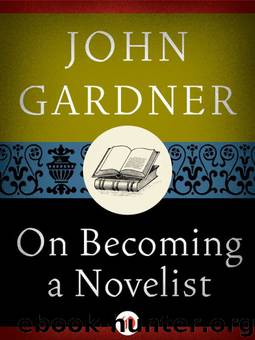On Becoming a Novelist by John Gardner

Author:John Gardner [Gardner, John]
Language: eng
Format: epub
Tags: ebook, book
Publisher: Open Road Media
Published: 2010-09-21T04:00:00+00:00
It is of course possible to become a good writer without a college education or, more specifically, without courses in literature. One does not have to be college-educated to be a sensitive and intelligent human being; in fact, there are some advantages to remaining one of the so-called common people, and thus avoiding the subtle social distancing higher education imposes. Writing ability, however improvable by teaching, is in large part a gift. If one cannot get to college, one need not despair of being a writer.
On the other hand, a college education gives advantages not to be lightly dismissed. The uneducated writer may successfully tell the stories of the people around him, may set down their longings and sufferings in comic or deeply moving or awe-inspiring ways; and if he is a self-educated writer, one who reads books, goes to good movies, and listens intently to the stories he hears among his friends and fellow workers, he may even become a subtle and original storyteller. But he will almost certainly remain a sort of primitive, that is, a kind of folk writer; he has difficulty becoming a virtuoso, one of those writers whose fictions impress us not only by their truth to life but also by their brilliance, their value as performance.
It’s hard to explain the difference between a well-educated writer, one who understands from inside the beauty of a play by Shakespeare, the strange genius of James Joyce, Andrei Bely, or Thomas Mann, and an equally intelligent writer who knows only “the world” or, at best, knows only the world and the popular books he can get from his local drugstore, from a book club, or at a nearby branch of Waldenbooks. The uneducated writer is, for one thing, locked in his own time and place. Not knowing (not really knowing) about Homer or Racine or the contemporary fiction of South America, not knowing the many different ways in which a story can be told, from the rough-hemp tale-spinning of the saga poets to the dandified French allegorical tricks of the Middle Ages to the strange ways of India and China or avant-garde contemporary Africans, Poles, or Americans, he is like a carpenter with only a few crude tools: a hammer, a knife, a drill, a pair of pliers. He has no knowledge of the cunning tools of other times and places, with the result that when he asks himself what the best way of telling a given story might be, he has only two or three answers available. Or to put it another way, he has very few models for his work. He may use superbly the models he knows, becoming the literary equivalent of a maker of fine Shaker chairs; but what he might have done had he known other ways and means we will never find out.
What the writer should study if he goes to college is debatable. A good program of courses in philosophy, along with creative writing, can clarify the writer’s sense of what
Download
This site does not store any files on its server. We only index and link to content provided by other sites. Please contact the content providers to delete copyright contents if any and email us, we'll remove relevant links or contents immediately.
Asking the Right Questions: A Guide to Critical Thinking by M. Neil Browne & Stuart M. Keeley(5775)
Autoboyography by Christina Lauren(5235)
Eat That Frog! by Brian Tracy(4537)
Dialogue by Robert McKee(4401)
Sticky Fingers by Joe Hagan(4198)
Journeys Out of the Body by Robert Monroe(3624)
Annapurna by Maurice Herzog(3467)
Full Circle by Michael Palin(3449)
Schaum's Quick Guide to Writing Great Short Stories by Margaret Lucke(3380)
Elements of Style 2017 by Richard De A'Morelli(3349)
The Art of Dramatic Writing: Its Basis in the Creative Interpretation of Human Motives by Egri Lajos(3067)
Atlas Obscura by Joshua Foer(2961)
Why I Write by George Orwell(2952)
The Fight by Norman Mailer(2940)
The Diviners by Libba Bray(2937)
In Patagonia by Bruce Chatwin(2930)
The Mental Game of Writing: How to Overcome Obstacles, Stay Creative and Productive, and Free Your Mind for Success by James Scott Bell(2908)
Venice by Jan Morris(2573)
The Elements of Style by William Strunk and E. B. White(2473)
